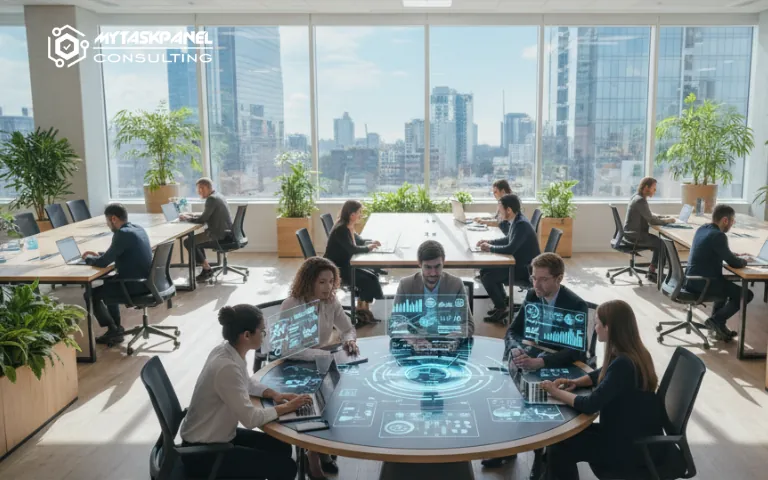From process automation to content generation, the impact of AI is undeniable. But the most disruptive changes are yet to come: the way AI will redefine the future of work, affecting not only operational tasks, but also business models, organizational structures, and the skills companies will demand.
In this article, we’ll explore how AI in the future of work will influence the daily operations of companies and tech consultancies, the opportunities and challenges it will bring, and how to prepare to lead this change.
The evolution of AI and its arrival at the heart of businesses
In its early days, AI focused on solving specific problems through specialized algorithms: data analysis, image classification, speech recognition. Today, advances in machine learning, deep learning, and generative models have expanded its applications to virtually every sector.
For example:
- In technology consulting: AI helps optimize project estimation, detect risks at early stages, and improve resource allocation.
- In financial services: it analyzes behavior patterns to prevent fraud in real time.
- In logistics: it optimizes routes, reduces costs, and improves delivery times thanks to predictions based on historical and real-time data.
This qualitative leap has turned AI from being merely a complement into a central component of business strategy.
Intelligent automation: beyond simple replacement
One of the most common fears about AI in the future of work is the massive loss of jobs due to automation. However, the real trend points toward intelligent automation, where AI not only replaces repetitive tasks but also enhances human capabilities.
Example in a consulting environment:
An AI platform can process large volumes of data from past projects, identify success patterns, and propose improvements in planning. Instead of spending hours on this collection work, the consultant can focus on designing strategies, personalizing proposals, and managing client relationships.
The result:
- Reduced operational costs.
- Greater accuracy in decision-making.
- Improved service quality.
AI in Strategic Decision-Making
The future of work will be defined by organizations’ ability to make decisions based on precise, real-time data. AI not only analyzes historical information but also predicts future scenarios, detects risks, and suggests corrective actions.
For example:
- In a software development company, AI can predict bottlenecks weeks before they occur, by analyzing commits, productivity metrics, and internal communications.
- In a tech consultancy, a predictive model can recommend which sectors or clients are most likely to demand services in the coming months, optimizing business strategies.
This gives organizations a competitive edge over those that still rely solely on intuition or manual analysis.
New roles and skills that will emerge
The arrival of AI doesn’t mean professionals will become expendable—it means the market will demand new skills:
- AI and data specialists: machine learning engineers, data scientists, AI architects.
- AI ethics and governance experts: to ensure algorithms are used responsibly and within regulations.
- Hybrid profiles: professionals with technical knowledge and a strong grasp of business needs.
- Tech-savvy project managers: capable of coordinating both human teams and AI systems.
Example: The project manager of the future will not only lead a team but also know how to interact with AI systems, interpret their recommendations, and adapt them to the client’s context.
Challenges and risks companies must manage
While the potential of AI in the future of work is enormous, its adoption brings challenges:
- Algorithmic bias: if training data is biased, automated decisions may perpetuate inequalities.
- Privacy and security: handling large volumes of sensitive data requires stronger cybersecurity policies.
- Technological dependence: excessive reliance on AI without human oversight can lead to critical errors.
- Cultural impact: introducing AI may generate internal resistance if not communicated properly.
The key lies in implementing AI with a human-centered approach, where technology is an ally rather than a blanket replacement.
Opportunities for tech consultancies
For consultancies, AI opens up a wide range of strategic opportunities:
- AI integration services: helping clients identify use cases, choose technologies, and adapt them to processes.
- Training and upskilling: programs to prepare internal teams to use and supervise AI.
- Algorithm audits: evaluating the accuracy, transparency, and fairness of clients’ AI models.
- Development of proprietary solutions: AI-based products tailored to specific industry challenges.
Example: A consultancy could develop a personalized recommendation system for e-commerce that not only suggests products but also predicts future consumption trends, improving inventory planning.
Preparing the organization for change
For AI implementation in the future of work to be successful, executives must follow a structured strategy:
- Define clear objectives: identify which problems or areas AI will address.
- Start with pilot projects: test impact before large-scale deployment.
- Build internal teams: avoid depending exclusively on external providers for critical knowledge.
- Measure and adjust continuously: establish clear KPIs to evaluate AI performance.
- Maintain strong internal communication: explain to employees that AI is there to enhance their work, not replace it.
Conclusion: leading change with vision and strategy
AI in the future of work is neither an inevitable threat nor an automatic cure-all. It is a powerful tool that, when implemented wisely, can improve efficiency, open new business models, and elevate the quality of human work.
For executives and tech consultancies, the challenge is not whether to adopt AI, but how to integrate it in a way that creates sustainable value. The future of work will be hybrid: humans and machines collaborating to solve complex problems, innovate, and build a smarter, more competitive workplace.

